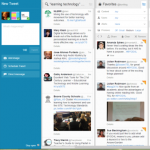Lots has already been written about using social media as an academic, so what can I add? Being honest, not much except perhaps to curate some of this for you and offer a brief summary. So if you’re new to social media as an academic, here are some useful things to consider.
For starters, the LSE impact of social sciences blog has featured some great articles
Pat Thomson has written about project blogs: What makes a successful research project blog? Forums for generating ideas fare better than sharing final results as well as Why do bloggers blog about blogging?
Inger Mewburn and Pat Thomson wrote about ‘Academic blogging is part of a complex online academic attention economy, leading to unprecedented readership.’ Across many of the blogs they looked at, they tended to be ‘academics talking to academics in an effort to advance knowledge and understanding’
Melissa Terras shared with us what happened to the dissemination of her work when she blogged and tweeted about it.
You need to tell people about your work if you want them to see it
What I’ve taken from these and the many other pieces about different forms of social media use, is that it is good to direct people’s attention to your outputs, as well as who you are. Melissa is right: people will read your work if you tell them about it. What I particularly like from Melissa’s post is that you can put in some of this effort after your work has already been published and not necessarily at the point it is published. I’ve found myself incredibly up to my eyes in work as a paper is coming out and wishing it could be delayed a week or two to allow me to ‘do the social media bit’. What Melissa has taught me is don’t worry, you can still do this later.
Time is often a factor people cite as why they struggle with social media
There are some really useful tips online for creating Twitter lists, to make the most of your time on Twitter.
I also use TweetDeck on my computer to monitor the different Twitter accounts I manage, and schedule posts. This displays as columns, and I can create a column simply to follow a conference hashtag, which is really useful if I’m not able to attend the conference. Here’s an example from a University of Sussex blog post (and they explain really well how to use this functionality).

Being able to schedule posts for the Sexual Health Research Network is really useful to help me manage my time and ensure there is regular activity on the account.
Select a platform and try to curate your information there rather than spread yourself thin by trying to maintain too many accounts. For example, if you like ResearchGate then try to keep that up-to-date and y’know it’s ok not to use anything else. Personally, I find ResearchGate a bit tricky to use and I don’t like how it displays information. A reason I started my own site was to have all the information I wanted to share in the one place, and where I was in more control of the content.
Finally, it’s also ok to be a ‘lurker’ – for example, to read twitter and not interact. The Nature Social Networks survey from 2014 showed that many academics want to share information and view information, but are less likely to want to interact. So, if you’re in that camp then you’re not alone.
It’s not equality of voice
I struggle with any training in social media use that assumes (by virtue of silence) that we all have equality of access and/or voice. Alison Phipps wrote about research impact work not being neutral, and Tressie McMillan Cottom has shared her experiences of being a black, female academic putting herself and her work into the public domain. What these examples should alert us to is the potential personal cost to putting oneself in the public domain. We hear about the importance of ensuring the public know of our work if it has been publicly funded, but we must protect our staff and students if they are at risk of being abused online in any way. It is also acceptable to remain offline and this must be something that institutions support and do not force social media use on anyone.

